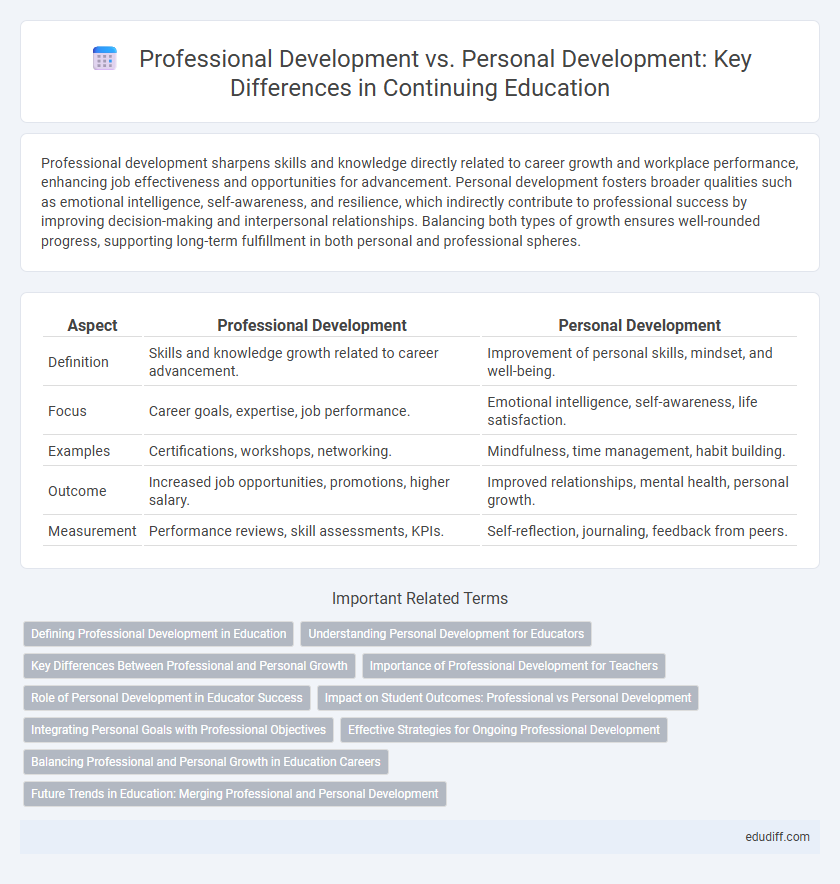Professional development sharpens skills and knowledge directly related to career growth and workplace performance, enhancing job effectiveness and opportunities for advancement. Personal development fosters broader qualities such as emotional intelligence, self-awareness, and resilience, which indirectly contribute to professional success by improving decision-making and interpersonal relationships. Balancing both types of growth ensures well-rounded progress, supporting long-term fulfillment in both personal and professional spheres.
Table of Comparison
| Aspect | Professional Development | Personal Development |
|---|---|---|
| Definition | Skills and knowledge growth related to career advancement. | Improvement of personal skills, mindset, and well-being. |
| Focus | Career goals, expertise, job performance. | Emotional intelligence, self-awareness, life satisfaction. |
| Examples | Certifications, workshops, networking. | Mindfulness, time management, habit building. |
| Outcome | Increased job opportunities, promotions, higher salary. | Improved relationships, mental health, personal growth. |
| Measurement | Performance reviews, skill assessments, KPIs. | Self-reflection, journaling, feedback from peers. |
Defining Professional Development in Education
Professional development in education refers to the ongoing process through which educators enhance their teaching skills, knowledge, and effectiveness to improve student outcomes. This includes attending workshops, earning advanced certifications, engaging in collaborative learning communities, and staying updated with the latest educational research and technology. Emphasizing evidence-based strategies and reflective practice, professional development is essential for maintaining high standards of instructional quality and adapting to evolving educational demands.
Understanding Personal Development for Educators
Understanding personal development for educators involves enhancing self-awareness, emotional intelligence, and reflective practices to improve both teaching effectiveness and student engagement. This growth supports educators in managing stress, fostering resilience, and cultivating a growth mindset, which directly influences classroom dynamics and professional longevity. Integrating personal development with professional goals creates a holistic approach that benefits educators' overall well-being and instructional quality.
Key Differences Between Professional and Personal Growth
Professional development emphasizes skills and knowledge that enhance job performance, such as technical expertise, leadership abilities, and industry-specific certifications. Personal development focuses on improvements in emotional intelligence, self-awareness, and life skills that contribute to overall well-being and personal fulfillment. The key differences lie in their objectives: professional growth targets career advancement and workplace effectiveness, while personal growth aims at holistic self-improvement and life satisfaction.
Importance of Professional Development for Teachers
Professional development for teachers enhances instructional skills, fosters innovative teaching methods, and directly impacts student learning outcomes. Continuous training ensures educators remain current with educational standards, technology integration, and curriculum changes. Investing in professional development cultivates a motivated workforce, leading to improved classroom management and student engagement.
Role of Personal Development in Educator Success
Personal development plays a crucial role in educator success by enhancing self-awareness, emotional intelligence, and resilience, which directly impact classroom effectiveness and student engagement. Unlike professional development, which targets skill acquisition and pedagogical strategies, personal development fosters intrinsic motivation and adaptive mindset critical for long-term career fulfillment. Educators who invest in personal growth demonstrate improved communication, stress management, and leadership qualities, contributing to a positive learning environment and sustained educational excellence.
Impact on Student Outcomes: Professional vs Personal Development
Professional development directly enhances teaching strategies and curriculum design, leading to improved student engagement and academic performance. Personal development fosters emotional intelligence and resilience in educators, creating a supportive classroom environment conducive to student well-being and motivation. Both forms of development contribute to student outcomes, with professional growth impacting instructional quality and personal growth strengthening teacher-student relationships.
Integrating Personal Goals with Professional Objectives
Integrating personal goals with professional objectives enhances motivation and promotes sustainable career growth by aligning individual values with workplace expectations. This synergy fosters a holistic approach to development, encouraging continuous learning and adaptability. Organizations that support this integration benefit from increased employee engagement and productivity.
Effective Strategies for Ongoing Professional Development
Effective strategies for ongoing professional development include setting clear career goals, engaging in continuous learning through workshops, certifications, and industry conferences, and seeking regular feedback for improvement. Leveraging mentorship programs and networking opportunities fosters skill enhancement and knowledge exchange, driving sustained professional growth. Utilizing digital platforms and personalized learning plans ensures adaptability to evolving industry trends and emerging technologies.
Balancing Professional and Personal Growth in Education Careers
Balancing professional and personal growth in education careers requires integrating skill advancement with self-awareness and emotional intelligence. Educators benefit from pursuing certifications and workshops that enhance instructional techniques while simultaneously engaging in reflective practices and wellness activities to support mental health. This holistic approach fosters sustained career success and personal fulfillment by aligning professional goals with individual well-being.
Future Trends in Education: Merging Professional and Personal Development
Emerging trends in education highlight the integration of professional and personal development, fostering holistic growth through adaptive learning technologies and personalized curricula. Platforms leveraging artificial intelligence enable learners to seamlessly enhance career skills while nurturing emotional intelligence and resilience. This convergence drives future-ready education models tailored to dynamic workforce demands and individual well-being.
Professional Development vs Personal Development Infographic

 edudiff.com
edudiff.com